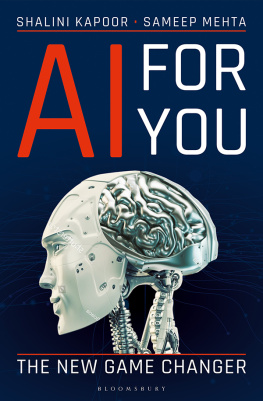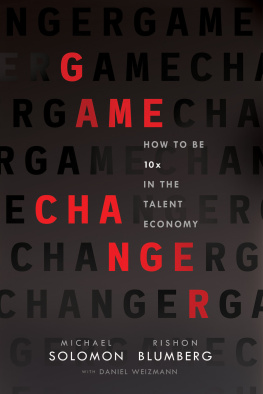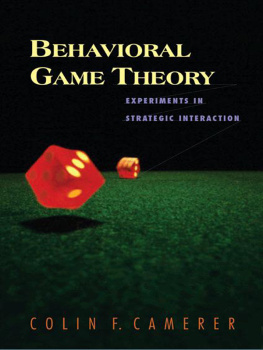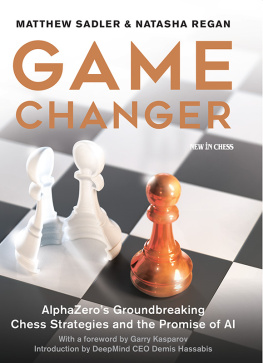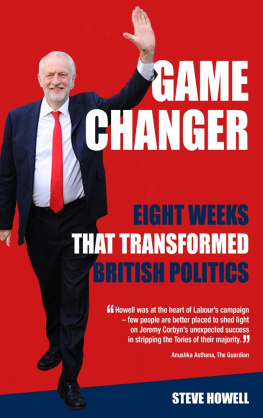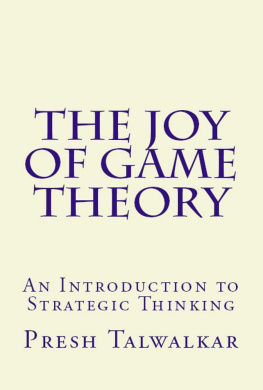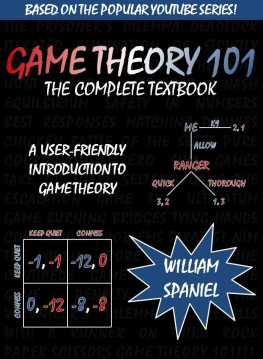David McAdams - Game-Changer: Game Theory and the Art of Transforming Strategic Situations
Here you can read online David McAdams - Game-Changer: Game Theory and the Art of Transforming Strategic Situations full text of the book (entire story) in english for free. Download pdf and epub, get meaning, cover and reviews about this ebook. year: 2014, publisher: W. W. Norton & Company, genre: Politics. Description of the work, (preface) as well as reviews are available. Best literature library LitArk.com created for fans of good reading and offers a wide selection of genres:
Romance novel
Science fiction
Adventure
Detective
Science
History
Home and family
Prose
Art
Politics
Computer
Non-fiction
Religion
Business
Children
Humor
Choose a favorite category and find really read worthwhile books. Enjoy immersion in the world of imagination, feel the emotions of the characters or learn something new for yourself, make an fascinating discovery.

- Book:Game-Changer: Game Theory and the Art of Transforming Strategic Situations
- Author:
- Publisher:W. W. Norton & Company
- Genre:
- Year:2014
- Rating:4 / 5
- Favourites:Add to favourites
- Your mark:
- 80
- 1
- 2
- 3
- 4
- 5
Game-Changer: Game Theory and the Art of Transforming Strategic Situations: summary, description and annotation
We offer to read an annotation, description, summary or preface (depends on what the author of the book "Game-Changer: Game Theory and the Art of Transforming Strategic Situations" wrote himself). If you haven't found the necessary information about the book — write in the comments, we will try to find it.
David McAdams: author's other books
Who wrote Game-Changer: Game Theory and the Art of Transforming Strategic Situations? Find out the surname, the name of the author of the book and a list of all author's works by series.
Game-Changer: Game Theory and the Art of Transforming Strategic Situations — read online for free the complete book (whole text) full work
Below is the text of the book, divided by pages. System saving the place of the last page read, allows you to conveniently read the book "Game-Changer: Game Theory and the Art of Transforming Strategic Situations" online for free, without having to search again every time where you left off. Put a bookmark, and you can go to the page where you finished reading at any time.
Font size:
Interval:
Bookmark:

For my children
Never forget how much I love you
CONTENTS
The game-theory approach to business ... has resulted in [many] strategic initiatives, from joint ventures to mergers to new-business development, that would have been unheard of in a traditional planning environment.
Raymond W. Smith, chairman of Bell Atlantic
I n a 1996 Fortune magazine article titled Business as War Game: A Report from the Battlefront, Raymond Smith wrote that the game-theory approach to business was the secret to Bell Atlantics success under his leadership as chairman during the telecommunications shake-up of the 1990s. Games are strategic situations and game theory is the art and science of strategy, but the game-theory approach to business is much more than just being smart and savvy about strategy. Indeed, as Smith explained, the game-theory approach to business requires a different kind of corporate manager: flexible, intellectually rigorous, and highly tolerant of ambiguity and a special kind of company [that] nurtures a climate of open, frank, and relentlessly objective discussion so that all the variables are scrutinized honestly and without political repercussions.
My goal in this book is to introduce you to the game-theory approach to life, in all its aspects, including business. At the heart of the game-theory mind-set is the recognition that the game can always be changed . This book will show you how to change the game, so that you can then enjoy a consistent strategic advantage over your competitors. The approach here is unusual, in two ways. First, although there are many different types of games worth knowing about, I will return time and time again to just one, the game known as the Prisoners Dilemma. The Prisoners Dilemma is important, with many wide-ranging applications, but the reason I focus on it is that game theory offers so many different ways to escape the dilemma in this game. As such, the Prisoners Dilemma provides a natural showcase of the power and versatility of game theory in practice.
In Part One (The Game-Changers Toolkit), we will explore six ways to change games (commitment, regulation, cartelization, retaliation, trust, and relationships), five of which allow one to escape the Prisoners Dilemma, and three other key game-theory ideas (the timing of moves, strategic evolution, and equilibrium). Each game-changing approach will have its own chapter, while each of the other key ideas is the subject of a separate Game-Theory Focus section. My hope is that you will finish Part One with a real sense of mastery over the Prisoners Dilemma, and with a toolkit of game-theory ideas that can be applied broadly to many other sorts of strategic situations.
The second unusual feature of this book is that I put my money where my mouth is and apply the game-theory approach that I preach to real strategic problems. Part Two (The Game-Changer Files) presents six tales of pressing strategic problems, varying in urgency and importance from how to keep prices low on the Internet (File 1) and how to build trust on eBay (File 5) to, I kid you not, how to save mankind from looming and seemingly unstoppable dread disease (File 6). In each case, I use the game-theory approach to identify the strategic crux of the problem, and then leverage that game-awareness to brainstorm ideas on how to change the game to solve or at least mitigate the underlying problem.
So, get ready for a ride. Youll emerge a deeper strategic thinker, armed and ready to gain a strategic advantage in all the games you play, in business and in life.
The wise win before they fight, while the ignorant fight to win.
Zhuge Liang, regent of the Shu kingdom, lived AD 181234
T he wise win before they fight. So wrote Zhuge Liang, the great statesman, scholar, and military commander of Chinas Three Kingdoms period. That may sound like an empty platitude, but it captures an essential truth. The wise win before they fight by recognizing all the games that could be played, steering the strategic environment in their favor, and then fighting with confidence in their ultimate victory. By contrast, the ignorant just play the game that lies before them, their victory or defeat largely out of their control, a matter of luck and fortune.
I refer to the wisdom of Zhuge Liang as game-awareness, the ability to see the strategic world around you with open eyes. Game-awareness helps protect you from the many dangers of not knowing what games you are really playing. Moreover, once you are truly aware of the games in your life, you can take steps to change them to your strategic advantage. Thats why, in addition to cultivating your game-awareness, my focus throughout this book is on how the lessons of game theory inform the art of changing games. Mastering this art will allow you to recognize and seize strategic opportunities that others do not see, giving you a significant advantage over your peers.
Over the past forty years, the science of game theory has risen from a fairly obscure branch of applied mathematics to the engine driving many of the most important intellectual advances in the social sciences. In the classroom, game theory is now a mainstay in a wide variety of fields, from economics and political science to business strategy, and is making inroads in disciplines such as law, corporate finance, managerial accounting, and social entrepreneurship, even biology and epidemiology.
Even if youve never heard of game theory, its lingo and concepts are in the air you breathe. What does Americas planned troop withdrawal signal to the Afghan Taliban? Will a Greek debt default lead to contagion and financial crises elsewhere? Did Sprints early investment in 4G WiMAX technology give them a first-mover advantage? These game-theoretic questions were all in the news in recent years.
Game Theory in Business
In 2005, Fast Company magazine made a splash with an article claiming that no one uses game theory in business. In their reporting, however, Fast Company doesnt appear to have spoken with any actual business leaders. Those people tell a different story: how game theory can and does give them and their businesses a strategic advantage.
First, game theory helps businesses plot tactics. The most obvious games in business are those played at the tactical levelhow to set prices, how to launch a new product, and so on. Management consultants the world over use game theory when formulating tactical strategic advice on how to win such games.
US military planners long ago learned the value of game theory for tactics. Before any major mission, they routinely play war games, in which one group of officers is tasked with playing the enemy and achieving the enemys objectives. War gaming is essential, as it exposes weaknesses in ones initial strategy and leads to a more robust final plan. On the other hand, a McKinsey global survey of over 1,800 business leaders found that about half dont even consider more than one of their own options when making important business decisions, much less how the competition might respond. Of course, that just gives your firm a leg up if you can deploy game theory in a more meaningful way.
Second, game theory provides actionable insights. We are surrounded by games whose outcomes affect us, including many over which we have little control. Game theory provides conceptual insights that allow one to understand and predict, before others, what is likely to happen in such games. For example, according to Tom Copeland, chairman emeritus of corporate finance at Monitor, a leading strategy consulting firm: Game theory can explain why oligopolies tend to be unprofitable, the cycle of overcapacity and overbuilding, and the tendency to execute real options earlier than optimal.
Next pageFont size:
Interval:
Bookmark:
Similar books «Game-Changer: Game Theory and the Art of Transforming Strategic Situations»
Look at similar books to Game-Changer: Game Theory and the Art of Transforming Strategic Situations. We have selected literature similar in name and meaning in the hope of providing readers with more options to find new, interesting, not yet read works.
Discussion, reviews of the book Game-Changer: Game Theory and the Art of Transforming Strategic Situations and just readers' own opinions. Leave your comments, write what you think about the work, its meaning or the main characters. Specify what exactly you liked and what you didn't like, and why you think so.

